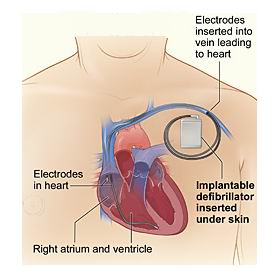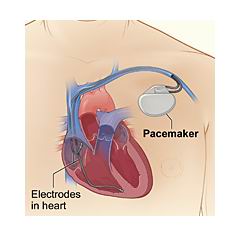An "implantable defibrillator" is more correctly called an "Implantable Cardioverter Defibrillator" or ICD for short. ICD's are intended for patients who have had or are at high risk for developing life-threatening rapid heart racing attacks called ventricular tachycardia (VT) or ventricular fibrillation (VF) that can lead to death. Technology has reshaped the units which have become smaller (current ICD's are little bigger than a pacemaker) and can be implanted pectorally. Anti-tachycardia pacing, low energy synchronized cardioversion, and high-energy defibrillation shocks can be given via a single transvenous lead.

These days ICD implantation is technically straightforward and only slightly more complicated than pacemaker implantation. Most patients get discharged within 24 to 48 hrs following post implantation device function checks. The patient is reviewed after 4 weeks and subsequently at 3 and 6 month intervals. The unit is tested for its functions and necessary parameters are noted.
ICD's are beneficial in terms of preventing sudden cardiac death and/or terminating potentially fatal ventricular arrhythmias among patients with Hypertrophic Cardiomyopathy (HCM). HCM is the commonest cause of non-traumatic sudden death in individuals below the age of 35 years and among athletes. ICD therapy is also the treatment of choice in high-risk patients with other forms of Cardiomyopathy such as dilated Cardiomyopathy or arrhythmogenic right ventricular Cardiomyopathy.
The Implant - This procedure generally takes about 2 hours. During this procedure, you will be sedated with an IV drug, but you will be breathing on your own. A local anesthetic will also be given so as to numb the area of incision
A incision is made under your collarbone, and the ICD is implanted under your skin in the upper chest (sometimes in the abdomen). A vein near your collarbone is cut during the procedure so the lead (or leads) can be guided through the cut vein into your heart's chambers, beginning with the right ventricle. The tip of the lead touches your heart's inner wall.
You may need another lead positioned in the upper right chamber of your heart. Where the leads go depends on your individual needs. You might need a lead placed just under the skin next to your rib cage. This would be placed through a small cut in your left side. Sometimes a lead is placed on the outside of your heart.
After the leads are in place, they're tested to make sure they read your heart beat properly. Then the leads are stitched to nearby tissue so they stay put. Finally, the leads' ends are hooked up to the generator. Your doctor will deliberately make your heart go into a funky rhythm. That's so he can test your ICD and make sure it will shock your heart back into normal rhythm on its own.

For a short time after the implant, the electrode at the end of the lead will actually "grow into" the wall of the ventricle - this won't interfere with heart function. You won't sense any of this because the inside wall of the heart is not sensitive to pain.
Hospital stay of would typically be for about 8 days.
Most ICDs now have a battery life of 5 to 7 years. The ICD has an internal beeper that will alert you if the battery gets too low. When the battery wears down, the whole unit has to be replaced.
The other major cardiac procedures are:
Few popular hospitals for ICD IMPLANTATION are:
Thailand, Malaysia, Singapore, Turkey and India are the most cost effective locations that offer up to almost 80% savings in comparison to the US.
SurgeryPlanet facilitates a plethora of services to the medical treatment traveler also which includes, a hassle free and discounted travel option, a welcome hand at the airport on arrival, travel in an air-conditioned car, round the clock service & support. Your medical evaluation is pre arranged with the least of waiting time. Once your assessment is complete and found medically fit, the procedure is immediately scheduled without a waiting period. Please read through our Services and Testimonials to understand and select your best options.
Implantable Defibrillator | Implantable Cardioverter Defibrillator | Rapid Heart Racing Attacks | Ventricular Tachycardia | Vt | Ventricular Fibrillation | Vf | Anti Tachycardia Pacing | Low Energy Synchronized Cardioversion | High Energy Defibrillation Shocks | Cardiac Death | Ventricular Arrhythmias | Hcm | Hypertrophic Cardiomyopathy | Dilated Cardiomyopathy | Arrhythmogenic Right Ventricular Cardiomyopathy | Hospitals Icd Implantation | Doctors Icd Implantation | Surgery Icd Implantation | Cost Icd Implantation | Treatment Icd Implantation | Destinations Icd Implantation | Icd Implantation India | Icd Implantation Recovery | Icd Implantation Information | Icd Implantation Thailand | Icd Implantation Malaysia | Icd Implantation Abroad | Icd Implantation Overseas | Icd Implantation Low Cost
SurgeryPlanet is an Healthcare Facilitator and not a Medical service provider. The information provided in this website is not to be used for diagnosis or treatment of any medical condition or use for any medical purposes. We provide information solely for medical travel facilitation and do not endorse any particular health care provider, hospital, facility, destination or any healthcare service or treatment listed. We are not an agent for, or affiliated to any health care provider, or service listed in our website and is not responsible for health care services provided by them. Choice of hospital or doctor for your healthcare services is your independent decision. Consult your domestic licensed health care provider before seeking the services of any health care provider you learn about from our website.


